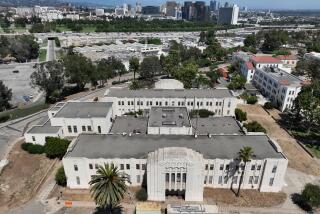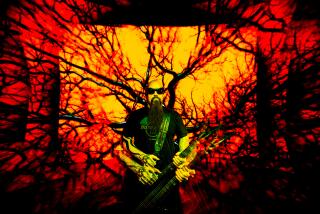A Veteran and a Song for Healing : Artist: Glen King recorded his song with help from the Judds. His work will be heard at a national reunion at the Vietnam memorial on Father’s Day.
- Share via
Vietnam veteran Glen King remembers the first time he learned he was going to Nashville to record a song with the backup band for the Judds. It was Dec. 14, his 45th birthday. He was at Playhouse West, a little 55-seat theater on Lankershim Boulevard in North Hollywood, where he had come to sing a song he had composed about Vietnam vets. When director Tony Savant told him about Nashville, he was so overwhelmed he couldn’t play the guitar. “I started to sing it, and the words went all to hell,” King said. “I forgot how to play.”
Six weeks later he was on a plane to Nashville, air fare and hotel paid, $600 in his pocket, compliments of the staff and students from Playhouse West. The Judds’ producer Don Potter and the Judd Boys band donated their musical services as well as an estimated $70,000 worth of studio time to record the song professionally. After three 10-hour days getting the arrangements right, King did the lyrics in two takes. And the next day he was flying back home with a master in his pocket, courtesy of Potter and the Judd Boys.
Upon a first hearing, “Heroes and Warriors” comes across as a gentle tug at the patriotic heartstrings with a little Jimi Hendrix feedback vibrato rolled in. It hasn’t yet been sent to radio stations. The man who wrote the words to the song, Playhouse West staffer Tony Savant, has just gotten the duplicates back, with the labels on the cassettes. But already advance copies are being played on stations in Atlanta, Palmdale and Virginia, and on the Armed Forces Radio Network. And Sons and Daughters in Touch, a support organization of people who lost their fathers in the war, are planning to play the song at a national reunion at the Vietnam Veterans Memorial in Washington on Father’s Day, June 21.
This is an astounding turn of events for someone such as King, who used to be an alcoholic and a drug user. Rootless, he had spent most of the past 25 years homeless, high, pushing a shopping cart, entertaining winos in alleys, sleeping in the streets because he was too drunk to make it up the stairs to his voucher-paid room.
He only remembers half of the ‘60s and “none of the ‘70s.”
King is an easygoing guy with an open manner and self-deprecating style. When he sings on Saturday nights at Playhouse West, he wears a sweat band around his forehead, which, along with his graying beard and ponytail, makes him look a bit like Willie Nelson. But this afternoon, sitting at the dining room table of Savant’s North Hollywood home, he’s reverted to the Vietnam vet look. Gold-rim aviator glasses, a black baseball cap with an American flag, a red, white and blue guitar pin, and his U.S. Navy insignia. A tattoo of a marijuana leaf is on the inside of his left arm. There’s an air about him of someone who has been places and done things, some of which he was too drunk to fully remember and others that he’d just as soon forget.
“I was just a normal kid. I had a dog and a treehouse. What has Vietnam done for me?” he asks, reciting a familiar mantra. “It just wrecked my life. But, hey, that’s OK. Have a nice day.”
Unlike those often literally blasted vets who were foot soldiers in the rice paddies of Vietnam, King spent his Vietnam tour as a sailor and a shipfitter aboard the nuclear-powered attack carrier Enterprise on Yankee Station in the Gulf of Tonkin. One day a Navy corpsman issued him an envelope of amphetamines for a weight problem. “I took the first one in 1965,” he said. “I got off of them last year.”
While King was aboard the Enterprise, his father died of a heart attack at age 51. By the time King was discharged from the service a year later, his mom had moved in with an older half-sister. King had always planned to work with his dad in the family tin shop, but without his father there to guide him, the business collapsed, and so did King’s now tenuous sobriety. The ‘60s were no time to be a veteran. “I felt homeless when I got out,” he said. “There just wasn’t no home to come home to.”
After that, King started drifting--Seattle, Alaska, Idaho, Montana, Bakersfield, San Francisco. He married and divorced three times. “I was one of those guys who left for a loaf of bread and didn’t come home for two or three days,” King said.
He worked as a shipfitter and a welder on bridges and offshore oil rigs. Between 1974 and 1979, he lived in Nashville. He had his own band, the Journeymen. He opened for other groups, went on tours, played in Best Westerns, Elks Lodges, Holiday Inns. He played his guitar for drinks and tips in bars. “I only made but $50 a night,” he said.
It was a hard life on a downhill slant. For the past eight years, King said, he’s been basically living in Bakersfield, “dealing drugs, having old ladies, pushing a cart and living on the street.” Then he saw how welcome the soldiers were after the Persian Gulf War. “And,” he said, “I decided to find a rehab program.”
At the Veterans Hospital in West Los Angeles, he heard about a play in North Hollywood that understood veterans without patronizing them. This led to his going to “Welcome Home, Soldier” in North Hollywood every Saturday night, and eventually to his singing “Heroes and Warriors” at the end of the show.
When Ashley Judd, a member of the “Welcome Home, Soldier” cast and daughter of country and Western singing star Naomi Judd, heard the song last Veterans Day, she brought it to the attention of her mother’s producer, Don Potter, and he promptly invited King to Nashville.
King said he was astonished at the professionalism of Potter and the Judd Boys. They worked three 10-hour days to lay down the music. “I didn’t play the guitar and just sit in the front of the microphone,” he said. “Everything was put together before I sang. All I did was put a set of headphones on, and there was the song. I really got into it. I was raising my hands and saluting when I say, ‘Glory, glory, my country, ‘tis of thee.’ ”
Actually, King said, he had a lot of help in high places. To prepare him for singing the lyrics, Potter called friends all over. “Louisiana, Texas, and asked them to pray for me. Then they blessed my hands and anointed my head,” he said. The notion was to have the Lord heal the pain of any veteran who heard King’s song.
As King sees it, the prayers must have worked. Before he left Nashville, he was attending church, and members of the congregation who had heard he was in town to do a song about veterans asked if he would sing it. “And all of a sudden,” King said, “this guy on my left really starts crying. He asks me if I would forgive him for being a war protester. Well, I just came unglued. I never had a protester hug me and apologize about being a protester before.”
King isn’t expecting that this song will revitalize his singing career. As soon as he gets out of the VA Hospital rehabilitation program later this month he’ll join a halfway program in Sylmar and register for a two-year college course in computer-aided design.
By the end of the month, he said, “I’ll be out of this program, but I won’t be out of this program knowing anything. I’m 45 years old. I’ve got to learn a whole new life.”
In the meantime, he does have one major aspiration for “Heroes and Warriors.” His son is 18 now, and his daughter is 11. The only thing he knows about them is what a baby-sitter told him back in 1980--”that my wife married a truck driver and moved to Illinois.” Although he hasn’t seen them since, he hopes that wherever they are or whatever they’re doing, they will hear his song and understand.
“I’m hoping this song gets me in contact with my kids again,” he said.
More to Read
The biggest entertainment stories
Get our big stories about Hollywood, film, television, music, arts, culture and more right in your inbox as soon as they publish.
You may occasionally receive promotional content from the Los Angeles Times.









